Get the evidence your attorney needs to win! ©
801-596-2455 | 877-648-8046
Free & Confidential Consultation
UT, AZ, WA, ID, CO, WY, IN, GA
By Jason K Jensen, LPI, MCJ
As seen in the Jan/Feb 2018 issue of PI Magazine
A cold case is an unsolved criminal investigation needing the discovery of new evidence or a new witness to get the case active again. Typically, the new evidence or witnesses are discovered through the creation of renewed interest in the case. New leads are caused by renewed activity fostered by new exposure, or repeated exposure of the case to the public creating dialog and inspiring new revelations not previously known by the original investigators.
Today, social media serves as a great platform for creating that renewed interest. Commonly, cold cases are unsolved murders or other high crimes. It’s important to note that old missing person cases can be investigated the same way as a cold criminal case. In many instances the missing person is the corpus delicti of a homicide.
A private investigator (PI) can become involved in a cold case when family members believe the case is not receiving adequate attention by the original investigators. Sometimes the case becomes cold at no fault of the law enforcement because the people with the information essential to the case refuse to talk to police due to their own involvement in the drug-world or because they associate with criminal elements.
Cold case investigations are easier now than ever thanks to the digital age, and social media. Just as the advent of DNA analysis was big for cold cases in the 1990s, the digital age in the 21st century is promising to be equally important. For the thrillseeking PI, cold cases are both challenging and rewarding. If done properly, they offer closure to a family in need, and provide vital assistance to police departments short on resources. Bear in mind, many of these cases will have to be conducted pro bono.
This checklist and instructions provide a realistic guide to using Facebook marketing tools as an investigative tool for cold case investigations.
Interview Family and Friends of the Decedent
Your primary starting point should be those family members and friends closest to the decedent or missing person. Typically, they are the ones who hired or contacted you, so addressing their concerns and identifying what they think happened is an important first step. Interview them in an informal setting in a conversation style. Often, the police suspect that a family member committed the crime, so doing these interviews might help to identify who is willing to speak with you, who is uncooperative, and who knows what truth is behind the police theory. This is also a way to determine whether there are contradictions between the statements of family members. Be sure to understand and clarify, if necessary, what the family’s theory is versus what the police theory was. Be distinct and clearly define both theories to avoid confusing yourself.
Notify the Police and Seek Cooperation/Access to Files - Don’t Be Offended.
Even though you want to help, don’t expect the police to open their files to you, but ask anyway. Request access to the files and propose in the alternative a brief review with the assigned police investigator. Obtaining records from the original case would be extremely helpful to you, but be willing to accept anything less that they are willing to share. You want them to know you are here to assist them and not to solve the case instead of them. Investigating crimes is a function for law enforcement and we are here to help them find leads, discover new evidence, and identify new witnesses. You also have a duty to let the investigating agency know who you are, and that you are independently looking at the case. What if you compromise their strategy? It is likely your records request will be denied, but if you are lucky you may get a phone call from the Major Crimes detective assigned to the case and learn some insight about their thoughts. Show gratitude. It goes a long way. Bear in mind though, your first source for learning the police theory should be from the family or friends of the decedent.
Use Databases and Open Source Materials.
Use databases to learn who the neighbors were, to learn more about key individuals at the time of the crime, and to search where to find them today. The advantage cold case investigators have over the original investigators are the years of criminal history and activities of the offender since the original crime. You can identify suspicious behavior and subsequent similar convictions. Also, important are all the open source materials available on the web about the case, including mugshots.com, ancestry.com, and Google.com street view. View old digital versions of news articles and video footage posted online by news agencies. Finally, social media is priceless today – Facebook, Instagram, Twitter, and other sites make locating individuals and analyzing them much easier---more than ever in history.
Develop Your Opinion of a Theory.
Using the information obtained from the family and friends, the police, news outlets, databases, social media and other open sources, develop your own case theory of possible suspects based upon your own professional experience and expertise: You should ask was it (a) a family member, (b) an acquaintance, or (c) a stranger? Who wanted the decedent to die or the person to disappear, or who would benefit most from a death or disappearance? If you feel strongly about one theory, you must also be able to articulate why it was not any other possibility. Who fits the theory and why or why not?
Develop Questions to Establish Motive.
With each potential theory, it is equally critical to develop questions in support of the theory, transforming theory into fact. We suggest you use these as a guide: Was the crime committed out of (a) love, (b) greed, or (c) revenge? Who was jealous? Who was desperate? Who was angry at the decedent? Additional considerations regarding a child abduction, or if the decedent was a child, are not covered in this article.
Crowdsource Social Media.
Generate an ad and use social media (i.e. Facebook, Instagram, Twitter, etc.) for targeted demographic ad placement to get the case in front of an audience. The audience you are seeking is targeted to maximize who most likely has information about the case or personal interest in the decedent. Keep the ad general, except concerning the decedent (you have to be specific about the victim). Because these are cold cases, you can deselect many younger user accounts to save money.
Have Patience.
Be patient – wait for responses to your ad. Paid ads will get the best results. Paid sponsoring of the ad will expedite the process. For example, Facebook will place ads in the news feeds of your targeted audience by demographics. Somebody out there knows something. Since you are working on a cold case, we can presume there has been a change of heart or a change of lifestyle, so that person is more willing to talk today than previously, and therefore will contact you. Be clear that we want to hear from them, and we pass no judgment. And if they want anonymity for their information, give it to them. These people may be afraid of the person responsible for the original death or disappearance. They may fear law enforcement. We are a safe listener to receive their statements.
Traditional Methods in Interviews and Evidence Collection.
As leads come in from social media, the traditional methods of interviewing and evidence collection start to kick in. This is where your past training should be strongest. In deciding when to interview or when to forward information to the police, you should pre-screen the responders first. As part of the pre-screening process, you must discern which ones are credible leads and which ones are not. Contact all responders to the targeted ads promptly. Don’t delay. Experience has shown that people can post a comment to your ad and then delete it later. Get their story before they change their minds about speaking out. Recently, while looking for a missing vehicle associated with a case, we received a responding question to a Facebook ad: "Didn’t the FBI already pick up that car?" The person was contacted immediately. From him, it was learned that the authorities were further along on the case than previously known. However, from that witness we also learned information that was overlooked by the police. Because they were not aware of that witness means no one had taken the description of the mysterious driver prior to our results from Facebook. Shortly after the interview, that witness deleted his question. Had the comment been deleted before the interview, perhaps we would have overlooked asking for an interview too. The new evidence and the new witness information obtained can be forwarded to the police investigators.
Using a recent case, here is a step-by-step tutorial how to use Facebook’s marketing tools as an investigative tool. To demonstrate the process, we take the missing person case of Jack Jason Simmons (hereinafter "Jason Simmons"). In that case, there had been no apparent leads and no activity for decades. Simmons was last seen in April 1994. He last telephoned his mother on April 8th of the same year. Hospital records showed that Jason Simmons was treated for an assault, a blow to the head with a framing hammer, on or about April 4th.
With a quick search on-line, we learned that Jason Simmons’ brother had posted on Facebook about his brother’s story. We contacted the brother, inquired whether there had been any updates, if anyone had been looking at the case, and whether any news about Jason Simmons had been learned since his disappearance. We were told there had been none, so we offered to investigate the case free of charge. Simmons’ brother gave permission. We jumped right into social media to crowd source in search of new witnesses and possible new evidence. At that time, we didn’t know where Jason Simmons had last resided in 1994. So, contacting former roommates or neighbors first was out of the question.
Step One. To benefit from the Facebook marketing tools, use a business page on Facebook. If you don’t have one already, create one. Some PIs fear that admitting being a private investigator online, or posting your own picture online, is risky business. They fear sharing that information on the internet places them at risk of being made on a job. No PI wants to be made on a surveillance job or exposed when they are working undercover. Meanwhile, others believe that a high-profile presence on the web attracts more business than it places them at risk. To be effective, crowd sourcing online, must instill legitimacy in the mind of the audience---especially if the message is going to find its way on to the news feeds of strangers. If we want to obtain a meaningful reaction, the audience must believe contacting you is safe to do. If you don’t have a Facebook business page, here is where you start.
In the upper right corner there is a drop arrow. Click on it.
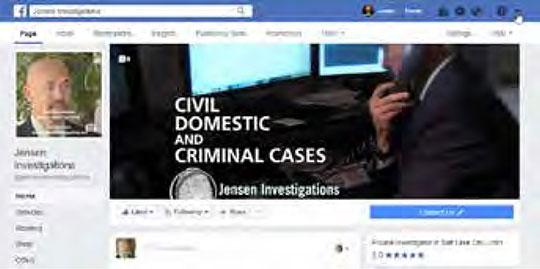
Then, click on “Create Page.”
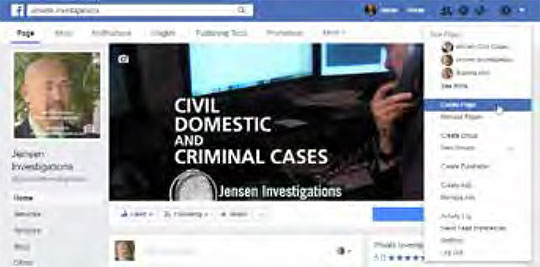
On the "Create a Page" screen, click on "Company, Organization or Institution".
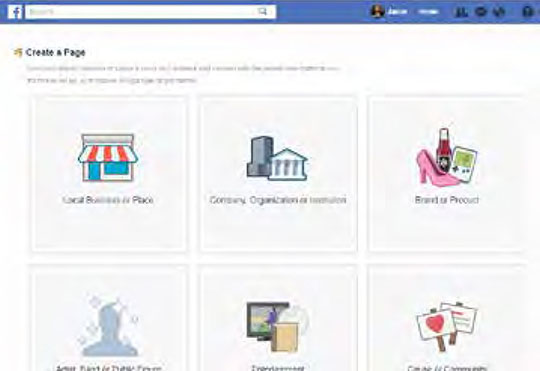
After that, choose a category that best fits your business, and then enter the company name. Your business page will be created instantly.

Now add images and fill in business content. Proceed to the next step.fStep Two. In this step, you’re ready to start posting. The temptation will be to announce your new page, to do so is marketing. Rather than marketing, use those same tools to find leads on a cold case. Turning to the Jason Simmons case, we created a Facebook post on September 26, 2017.
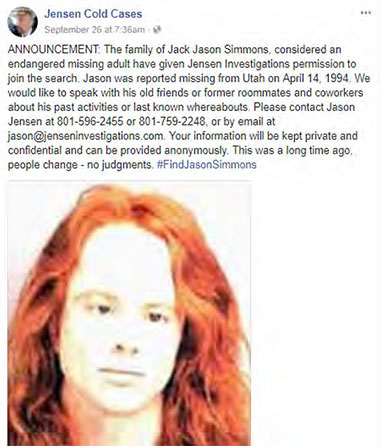
Recommendation: Pictures grab the readers’ attention first, before the content. Always post using a relevant image. In this case, it was the 1994 image used on Jason Simmons’ missing person flyer. When writing your content, be concise and make the message a call to action, and provide contact information. In our profession, it is widely regarded that there is a certain cross-section of society that is averse to the police. Private investigators are most effective with that section of the population. Finish your post with a hashtag or hashtags, and now you’re almost ready to publish the post. But before you do, on to the next step.
Step Three. Eventually, relevant content will find its way around the web, but usually very slowly. Don’t rely on the post to make it around organically. You can speed things up from taking months-and-years to get around, to only taking days-and-weeks. In many cases, we get responses within minutes or hours. For business pages, Facebook has marketing tools to drive consumers to your page. We can use those marketing tools as an investigative tool.
As you are typing your post, before you hit the "Publish" button, you’ll want to boost this post and you’ll want to add the "Messenger" button to make things easy for your audience to contact you. If the audience delays, they may not come back to you. The post concerning Jason Simmons was made on September 26, 2017. By October 3, 2017, Jason Simmons’ fate was learned. He was killed execution style after the first attempt with a hammer failed. He was buried in the hills near Salt Lake. The details concerning that location is withheld from this article because the case is currently an active investigation instead of a cold missing person case. We also learned who the likely participants were. Some informants called by phone; others contacted us through Facebook Messenger.
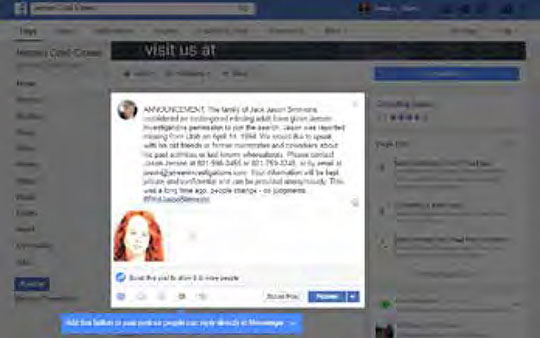
Step Four. Click on the "Boost Post" tab. Usually, if just marketing, you would want a broad audience. But this isn’t a marketing ad. The next screen will allow you to refine your target audience. To narrow the focus of the ad placement, your audience can be refined by location, age or gender. Click on the "Edit" button next to "People you choose through targeting".

Step Five. For cold cases, your target audience is an older crowd. In the case of Jason Simmons, we selected the last known city where Jason Simmons formerly lived, and selected a distance of 25 miles. Since Jason Simmons disappeared in 1994, we adjusted the age demographic, narrowing the target ages to be between 32 and 65+, preventing the ad from appearing on news feeds of younger Facebook users. We believed the targets with information would have been between 17 and 30 in 1994.
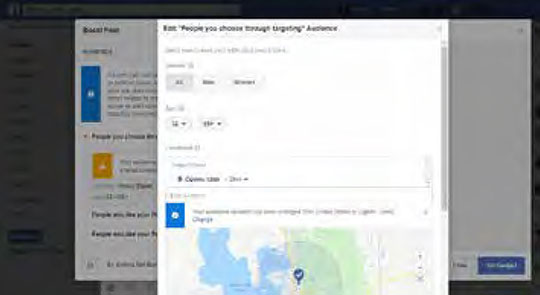
Scroll down to add additional demographics, interests and behaviors. If you cannot think of any Facebook has a "Suggestions" button, mostly marketing phrases. When finished, click on "Save". Then click "Set Budget" and enter the sum you’re willing to spend. Usually $50 is plenty. Close by clicking "Publish."
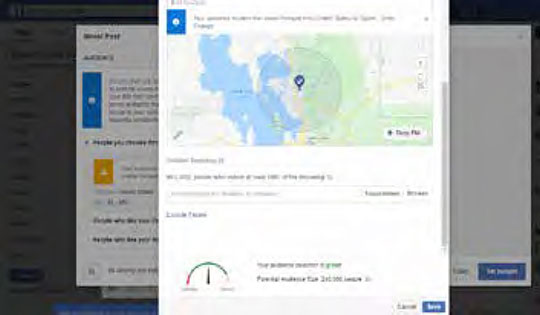
Facebook will track the ad and report to you the results showing you how well the ad is performing. Also, people can respond to it in the same way you have experienced in the past. They can share the post, like it, and comment.

The success of the Jason Simmons campaign demonstrates that the days of old where a missing person flyer hanging on a post office bulletin board are over. There is a reason why they hang there year after year. With the digital age, especially due to social media, we have the tools to get the message directly to the people with the information we need. In the case of Jason Simmons, once the leads were identified, the information was forwarded to the Major Crimes detective assigned to the case. Our mission was accomplished.
 Jason K Jensen is the director of Jensen Investigations in Salt Lake City, Utah. He has a master’s degree in criminal justice, and has conducted investigations for 23 years, 10 years as a private investigator. He is a member of the American Investigative Society of Cold Cases (AISOCC). Contact Jason K. Jensen at 877-648-8046 or 801-596-2455.
Jason K Jensen is the director of Jensen Investigations in Salt Lake City, Utah. He has a master’s degree in criminal justice, and has conducted investigations for 23 years, 10 years as a private investigator. He is a member of the American Investigative Society of Cold Cases (AISOCC). Contact Jason K. Jensen at 877-648-8046 or 801-596-2455.
 The American Investigative Society of Cold Cases (AISOCC), is a non-profit, volunteer-based professional association founded by Det. Kenneth L. Mains. Its mission is to assist in solving cold cases using various disciplines, including crime scene reconstruction, crime scene assessments, inductive/deductive criminal profiling and reasoning to look towards finding resolutions for a cold case, and collectively offering advice and suggestions to law enforcement professionals for furthering their cases. Qualifications for membership vary depending on the member type: Honorary Review Board, Corporate, Consulting Committee, General, and Student Membership.
The American Investigative Society of Cold Cases (AISOCC), is a non-profit, volunteer-based professional association founded by Det. Kenneth L. Mains. Its mission is to assist in solving cold cases using various disciplines, including crime scene reconstruction, crime scene assessments, inductive/deductive criminal profiling and reasoning to look towards finding resolutions for a cold case, and collectively offering advice and suggestions to law enforcement professionals for furthering their cases. Qualifications for membership vary depending on the member type: Honorary Review Board, Corporate, Consulting Committee, General, and Student Membership.
Founder, Kenneth L. Mains is a United States Marine Corps Veteran and Detective who specializes in cold cases, using a unique combination of forensic science, criminal investigation, forensic psychology, victimology, crime reconstruction, crime scene assessment and criminal profiling to solve cases.
For more information on AISOCC: www.aisocc.com.
Headquartered in Salt Lake City, Utah, Jensen Investigations works in the following states:
Consultations are Free and Confidential
888-964-1924